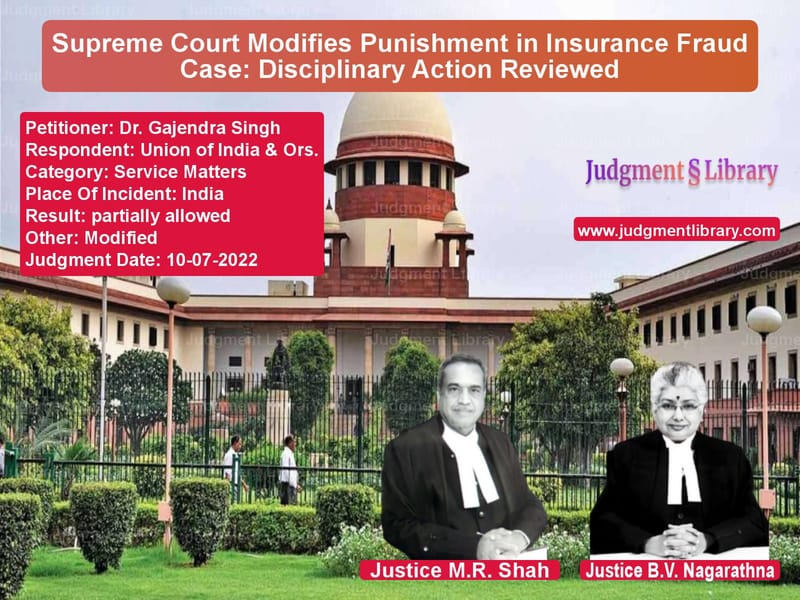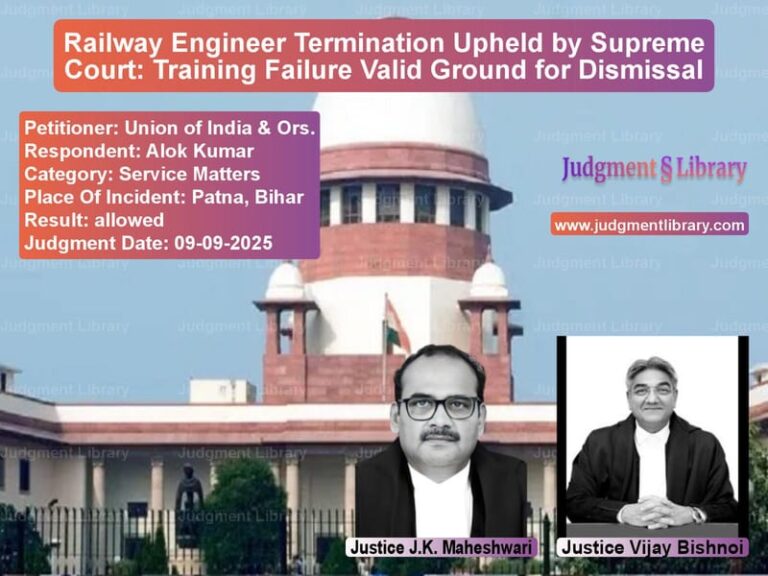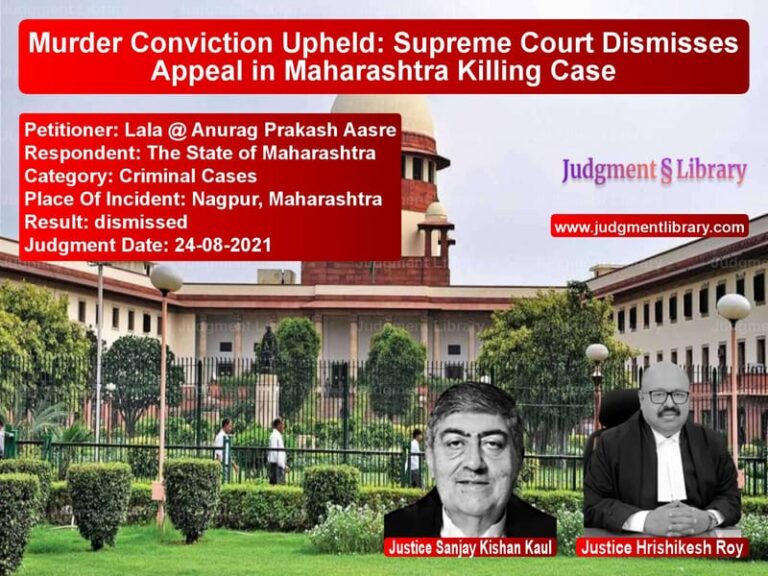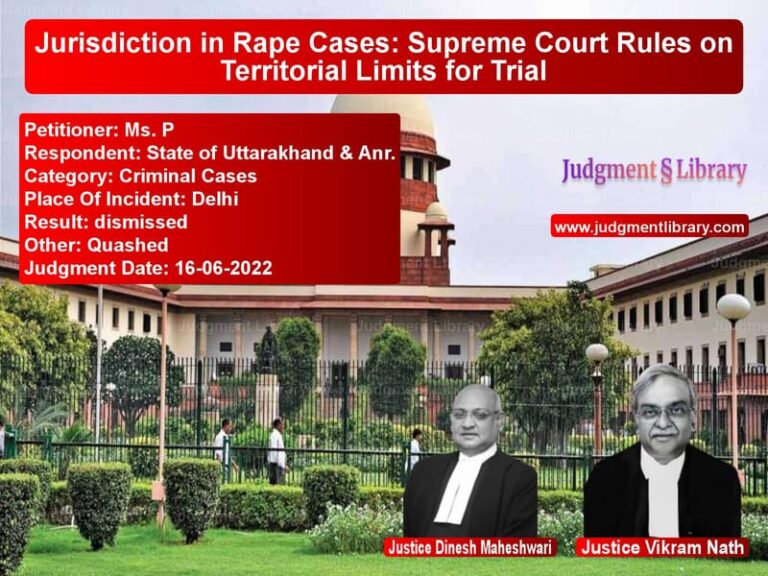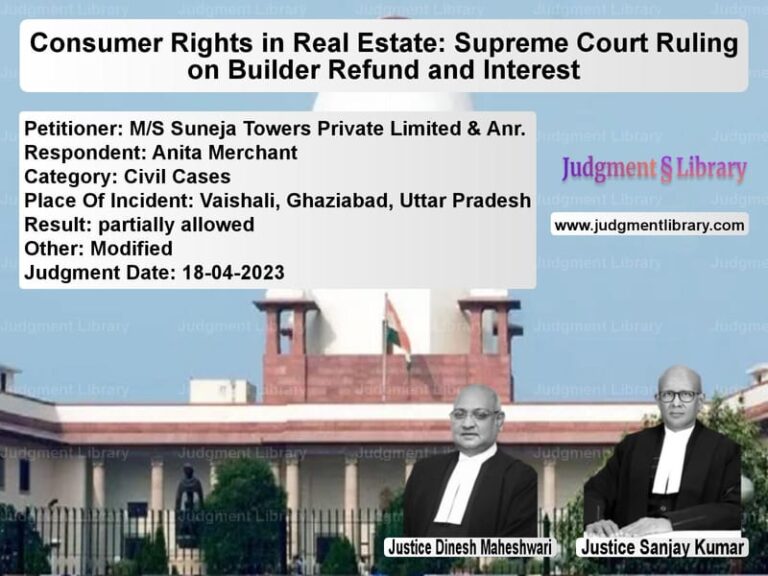Supreme Court Modifies Punishment in Insurance Fraud Case: Disciplinary Action Reviewed
The Supreme Court’s judgment in the case of Dr. Gajendra Singh vs. Union of India & Ors. provides critical insights into the principles of proportionality in disciplinary action. The case involved the removal of an employee from service due to alleged misconduct in issuing an insurance cover note without receiving the premium payment. The Supreme Court ultimately ruled that while the employee’s actions were wrongful, the punishment of removal from service was too harsh and needed reconsideration.
Background of the Case
The appellant, Dr. Gajendra Singh, served as a Branch Manager at the United India Insurance Company during the period 1995-96. The charges against him stemmed from the issuance of an insurance cover note without first collecting the premium, which allegedly led to a financial loss for the insurance company.
The sequence of events was as follows:
- Dr. Gajendra Singh issued an Insurance Cover Note (No. 543675) on March 20, 1996, for a vehicle belonging to one Chander Singh for the period March 20, 1996, to March 19, 1997.
- On the same day, he issued another cover note.
- It was later found that for the first cover note, no premium had been collected, while for the second one, a cheque was issued, but it bounced.
- The insured vehicle met with an accident on April 20, 1996, and the owner filed a claim based on the first insurance cover note.
- The Motor Accident Claims Tribunal awarded a compensation of Rs. 3,24,400, which the insurance company had to pay.
Following this incident, a charge sheet was issued against Dr. Gajendra Singh on October 18, 2001, alleging that he had caused financial loss to the insurance company by failing to collect the premium before issuing the policy. The disciplinary authority found the charges proved and imposed the penalty of removal from service, though without disqualification for future employment.
Petitioner’s (Dr. Gajendra Singh) Arguments
Dr. Gajendra Singh challenged his removal, contending:
- He had acted in good faith and relied on the insured’s assurance that the premium would be paid.
- The insured had a long-standing relationship with the insurance company, making it reasonable to assume that he would pay.
- While an error had been made, it was not an intentional act of fraud or misconduct.
- His service record was unblemished, and he had worked for over 20 years without prior allegations.
- The penalty of removal was excessive and disproportionate to the nature of the offense.
Respondent’s (Union of India) Arguments
The respondents, representing the United India Insurance Company, argued:
- Issuing an insurance cover note without collecting the premium was a serious breach of duty.
- His actions resulted in a financial loss of Rs. 3,24,400 to the company.
- Insurance policies are legally binding contracts, and issuing one without payment violated fundamental industry principles.
- Integrity in financial transactions was essential for a managerial officer, and leniency in such cases would set a dangerous precedent.
- The punishment was in line with the disciplinary rules of the company.
Supreme Court’s Observations
A bench comprising Justices M.R. Shah and B.V. Nagarathna reviewed the facts and legal principles surrounding proportionality in disciplinary proceedings. The Court made the following observations:
- The appellant had rendered over 20 years of service with no prior misconduct.
- The insured was a long-time customer of the insurance company, and the appellant issued the cover note based on prior trust.
- The second cover note, for which a cheque was issued but later bounced, should have led to the cancellation of the first note. However, the appellant failed to do this.
- Although his actions resulted in a loss to the company, there was no dishonesty or malafide intent involved.
- Failing to collect the premium was a procedural lapse, not an act of fraud.
- The disciplinary authority had overstepped in imposing the penalty of removal from service, which was disproportionate to the nature of the offense.
Final Judgment
The Supreme Court ruled in favor of the appellant, stating:
“Considering the plausible explanation given by the appellant and the long-standing relations between the insured and the insurance company, we are of the opinion that the punishment of removal from service is disproportionate to the charge and the misconduct held to be proved.”
The Court set aside the penalty of removal and directed the disciplinary authority to impose a lesser punishment. The case was remitted back to the disciplinary authority to determine an appropriate penalty, which could include suspension, demotion, or another proportionate measure.
Key Takeaways
- Proportionality in Punishment: Disciplinary actions should match the severity of the misconduct.
- Judicial Review of Employer Decisions: Courts can intervene if penalties imposed are excessive.
- Procedural Lapse vs. Malafide Intent: Unintentional errors should not be treated with the same severity as deliberate fraud.
- Long-Term Service Record: Courts consider an employee’s past service when deciding disciplinary matters.
- Employer Discretion: The judgment reaffirms that while disciplinary authorities have discretion, it must be exercised reasonably.
Conclusion
The Supreme Court’s ruling in Dr. Gajendra Singh vs. Union of India & Ors. establishes a critical precedent in employment law, particularly in cases involving disciplinary action for procedural lapses. The decision highlights the importance of proportionality in punishment and ensures that long-serving employees are not subjected to unduly harsh penalties for minor infractions. The case serves as a guiding principle for organizations in handling internal disciplinary actions in a fair and balanced manner.
Petitioner Name: Dr. Gajendra Singh.Respondent Name: Union of India & Ors..Judgment By: Justice M.R. Shah, Justice B.V. Nagarathna.Place Of Incident: India.Judgment Date: 10-07-2022.
Don’t miss out on the full details! Download the complete judgment in PDF format below and gain valuable insights instantly!
Download Judgment: dr.-gajendra-singh-vs-union-of-india-&-ors-supreme-court-of-india-judgment-dated-10-07-2022.pdf
Directly Download Judgment: Directly download this Judgment
See all petitions in Employment Disputes
See all petitions in Termination Cases
See all petitions in Public Sector Employees
See all petitions in Disciplinary Proceedings
See all petitions in Other Cases
See all petitions in Judgment by Mukeshkumar Rasikbhai Shah
See all petitions in Judgment by B.V. Nagarathna
See all petitions in partially allowed
See all petitions in Modified
See all petitions in supreme court of India judgments July 2022
See all petitions in 2022 judgments
See all posts in Service Matters Category
See all allowed petitions in Service Matters Category
See all Dismissed petitions in Service Matters Category
See all partially allowed petitions in Service Matters Category

